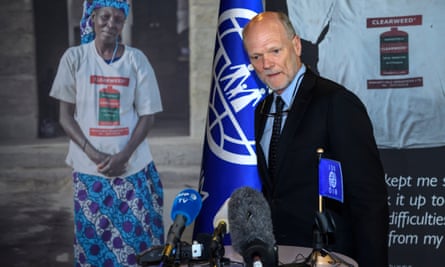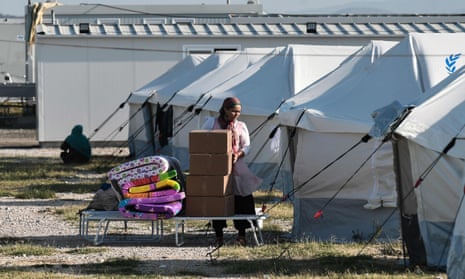Leaked communications suggest that the UN’s migration agency is censoring itself on the climate crisis and the global compact on migration, following pressure from the US government.
An email sent by a US-based official of the International Organization for Migration (IOM) on 28 August to colleagues around the world relayed that the US state department’s Bureau of Population, Refugees and Migration (PRM) told the agency documents related to programme activities it funds “must not be in conflict with current [US government] political sensitivities”.
Sensitivities include the climate crisis, sustainable development goals, the global compact for migration and “anything that seems at odds with the administration’s take on US domestic/foreign issues”, the official wrote in the email.
“Documents related to programme activities, especially those that will be published online, may require prior review and approval by the donor,” they went on, requesting that colleagues use “discretion” and share relevant documents “in enough time to make any necessary adjustments in coordination with PRM”.
The email’s author noted that “PRM is very willing to cut funding in areas that it deems are not in line with US foreign policy objectives”, and asked that the substance of the email be conveyed by regional coordinators “to all country focal points”.
The Guardian understands from IOM sources and further communications it has seen that the agency is avoiding direct references to climate change in documents for projects funded by other US government entities such as USAid.
IOM receives about a quarter of its total budget of $2bn (£1.6bn) from the US, $18m of which is provided by PRM.
There is no indication that messaging on projects funded by other donors will be censored, or that there will be any operational impact on existing programmes.
However, a source in the humanitarian community in the US who had recently left IOM, told the Guardian he was “very concerned … that IOM is acquiescing to this kind of pressure”.
“I’ve seen a response [to the email] from at least one regional official who explicitly asked staff not to directly refer to climate change or the global compact on migration in a range of reports or proposals that would be sent to the US government,” he said.
“While I understand that IOM are simply doing what they think is strategically necessary to protect funding for important projects, senior officials should be mindful of the fact that there’s a slippery slope here,” he continued.
Jeff Crisp, a research associate at Oxford University’s Refugee Studies Centre who previously held a senior position in the UN’s refugee agency UNHCR, said the leaked message “raises some serious questions about the autonomy of IOM, its sensitivity to positions adopted by the US administration, and its ability to function as a member of the UN system”.
Akshaya Kumar, director of crisis advocacy at Human Rights Watch, said: “Confronting climate change may very well be the issue that defines our time. Agencies in the UN family shouldn’t be towing the Trump party line.”
Tensions between the US and IOM have simmered over the past year, when Ken Isaacs, the proposed US candidate to head the agency, became the first American since the 1960s to be rejected as its top official, prompting concerns that funding from the state department could be cut.

Press reports at the time revealed that Isaacs had made comments online expressing doubts over the evidence for climate change, suggesting it was a “hoax”.
President Trump himself has expressed doubts about the effects and causes of climate change, while the US objected to the global compact on migration, describing it as a “pro-migration” agreement and an “effort by the United Nations to advance global governance at the expense of the sovereign right of states”.
Leonard Doyle, IOM’s head of communications, said: “IOM recognises and respects the priorities and limitations of its donors, including the US. We seek to ensure that staff are aware of such sensitivities when drafting funding proposals for activities which are a response to migration trends and which follow best practice.”
A US state department spokesperson said: “IOM is an important partner for the United States around the globe. The US government supports organisations such as IOM, to conduct programmes and activities that are consistent with our foreign policy goals and objectives.”
